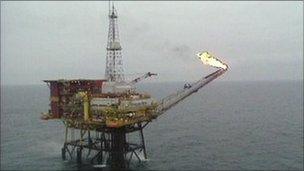North Sea drilling activity rises, Deloitte says
- Published

There have been 37 wells drilled in the North Sea so far this year
Drilling activity in the North Sea has risen by 45% from the second to third quarter of this year, according to financial consultants.
However, Deloitte said the overall trend was continuing to fall.
The North West Europe Review, which documents drilling and licensing on the UK Continental Shelf (UKCS), reveals that 16 wells were initiated between 1 July and 30 September.
This compared with just 11 in the second quarter.
The figure was also 36% fewer than during the same period last year.
This brings the total number of wells drilled so far in 2011 to 37, a 41% decrease on the same period last year and the lowest number drilled in this period since 2003.
Deloitte's petroleum services group said the trend was not what would be expected during a period when the average oil price is more than $100 per barrel.
Tax increases
Graham Sadler, managing director of Deloitte's petroleum services group, said: "Elsewhere in North West Europe this buoyant oil price has driven high levels of drilling activity.
"It could be that factors, including the relative geological maturity of the UK sector, compared to some adjacent regions, and the alterations made to the UK fiscal regime earlier this year have impacted business confidence."
He said some smaller, UK-focused companies may also have experienced difficulties securing finance to fund exploration and appraisal drilling in recent months.
"A combination of the tax increases announced in the 2011 Budget and general market instability around the eurozone crisis, has led to some of these companies losing significant corporate value," he said.
"This may have inhibited the ability of smaller companies, which today hold significant acreage on the UKCS, to finance drilling programmes planned for 2011."
The Norwegian sector recorded double the number of wells (16) started in the third quarter of 2011 compared with the same period last year.
This matches the figure for 2009 which saw the highest levels of drilling activity on the Norwegian Continental Shelf to date.
Mr Sadler added: "A number of jack-up and semi-submersible rigs have been stacked in UK waters during the third quarter of 2011, so it is unlikely that a lack of rig availability is contributing to the low levels of drilling activity in the UKCS.
"However, the lack of availability of more heavy duty rigs, including drillships required when drilling in the extreme conditions west of Shetland, may be impeding exploration in these areas."
'Risky deals'
Corporate deal-making has risen, with four acquisitions announced during the third quarter compared with two in the previous quarter, one of which did not go ahead.
Derek Henderson, energy partner at Deloitte in Aberdeen, said: "We saw two different types of acquisition this quarter - both corporate takeovers and acquisitions of subsidiaries, in order to gain interest in a particular asset.
"The consistently high oil price may have encouraged companies, and provided them with the opportunity, to review their portfolios with a view to engaging in merger and acquisition activity.
"It may also have allowed organisations to undertake larger, more risky deals and, in these conditions, companies may be more interested in buying production assets as opposed to exploration opportunities."
He added: "The high level of farm-in activity we saw in the second quarter meanwhile has dropped, with only six deals reported during the third quarter compared to 13 in the previous quarter.
"Whilst this drop appears significant, the number of deals of this type was particularly high in the early part of 2011 and the number of deals announced so far this year is already greater than the total announced during the whole of 2010."
- Published13 October 2011
- Published21 September 2011
- Published25 August 2011
- Published6 September 2011
- Published8 April 2011
- Published5 April 2011
- Published29 March 2011